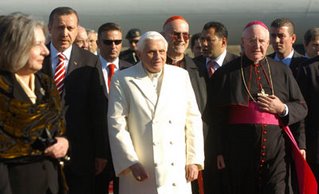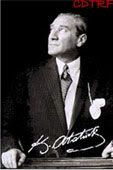Tiptoeing through a spiritual minefield

WHEN expectations are abysmally low, almost anything can come as a pleasant surprise. Barring last-minute upsets, that seemed to be the conclusion people on all sides were drawing as Benedict XVI pursued one of the trickiest diplomatic missions ever undertaken by a pope.
You are not wanted! Don't come! Don't cause tension!? screamed a headline in Turkey's noisiest Islamist newspaper, Vakit, on the eve of the papal visit to Turkey this week. In case anybody was vague about the theological differences between the world's two largest monotheistic faiths, participants in an anti-papal protest held up a placard that spelled it out: to Muslims, Jesus Christ is not the son of God, he is a prophet of Islam. Cooler-headed Turks?the great majority?were embarrassed by the stridency of their pious compatriots, but some still resented the pope's visit because it gave hotheads such a perfect opportunity to sound off.
Against this gloomy background, the set-piece encounters between the pope and Turkey's leaders, secular and religious, brought sighs of relief all round. Recep Tayyip Erdogan, the mildly Islamist prime minister, showed once again his gift for drawing back from the brink of crisis by agreeing at the last minute to meet the pontiff at Ankara airport. Mr Erdogan claimed afterwards that one of Europe's most prominent Turco-sceptics had been converted into a supporter of his country's European Union membership?at a time when that flagging cause needs all the help it can get (see article). Whether Benedict really has overcome his personal doubts about Turkey's EU membership is open to question; but the new Vatican line is that, if Turkey meets the necessary conditions (including respect for Christian rights) to join the club, that can only be good.
In a gesture of personal humility that Turks found impressive, the pope also called on the country's top religious bureaucrat, Ali Bardakoglu, who looks after Muslim affairs, at his office. It was a somewhat surreal encounter: each side fielded 11 officials, like a football team, while a Turkish actress, best known for her roles in steamy films and her startling changes of hair colour, served as interpreter. But it gave the pope a chance to say what he really believes about relations with Islam: that the two faiths should have an ?authentic dialogue? and get better acquainted, while avoiding the mistake of seeming to paper over their differences.
Behind the diplomatic politesse, however, lurk some hard, unresolved issues over Turkey's relationship both with other faiths and with its potential Western partners. The day after he met the pope, Turkey's president, Ahmet Necdet Sezer, said that he was blocking several provisions of a law designed both to satisfy a long-running EU demand and to respond to one of the biggest grievances of the country's religious minorities.
As passed by parliament on November 9th, the law would have made it easier for non-Muslim religious foundations, and foundations controlled by foreign interests, to acquire property?or, in cases where it had previously been confiscated by the state, to reclaim it. Over the Turkish republic's 83-year life, property worth hundreds of millions of dollars?schools, hospitals and orphanages, for example?has been appropriated from non-Muslim religious communities, and in particular from the Greek Orthodox church in Istanbul. Attempts to regain it have generally been blocked by arcane procedural and legal manoeuvres.
The president's veto on parts of the bill will hardly be seen as a kind gesture towards Europe, or to local Christians. If the avowedly Islamist Mr Erdogan had blocked the reform, it would have been interpreted as a sign of Muslim antipathy towards Christians. Coming from the president, the gesture speaks of lingering xenophobia among Turkey's secular elite.
As he made his way round Turkey, the pontiff was no doubt mindful not only of the deep differences of opinion among Turkish Muslims, but also of some highly sensitive issues in intra-Christian diplomacy that were the original objective of his trip. He first planned to come to Turkey as a guest of Patriarch Bartholomew I, the 270th archbishop of Constantinople and New Rome. The goal was to pursue closer relations between Roman Catholicism and Orthodox Christianity, in which the Istanbul-based prelate ranks as first among equals.
On the face of things, the papal visit is a much-needed boost to the morale of the patriarch, whose local flock has shrunk to only a few thousand, thanks to a steady exodus of Istanbul Greeks that started after state-sponsored pogroms in the 1950s. But extravagant gestures of fraternity between pope and patriarch still upset several other parties. The first of these are Turkish nationalists, inside and outside the state, who are always suspicious that the Orthodox prelate may compromise Turkish sovereignty by trying to establish a ?Vatican state? on the soil of their republic. Also watching warily are devout Orthodox Christians around the world, who stand ready to denounce the patriarch if he appears to backslide on any doctrinal points.
Perhaps the wariest observers are the Russian authorities, both lay and clerical. As the pope has quickly found, his declared wish for rapprochement with Orthodox Christians has opened up an old fault-line in the Orthodox world between the Russians, who see themselves as top Orthodox dogs by virtue of numbers and geopolitical power, and the Istanbul patriarchate, which enjoys an historic ?primacy of honour? among Orthodox sees.
In September, when senior bishops of the Roman Catholic and Orthodox world held their first formal encounter for many years, the Catholics were embarrassed to find themselves witnessing a big Greco-Russian squabble, laced with intricate arguments over the meaning of decisions taken 1,500 years ago. In a world where politics and religion inexorably overlap, such matters affect diplomacy too.
Take the thorny issue over whether the Istanbul bishop may style himself ?ecumenical? or universal patriarch. The Turkish state says no: his followers, including an influential lobby of Greek-Americans, say yes. A fresh spat broke out only this week when the Turkish authorities declared that the patriarchate's security badges for the papal visit were invalid because they employed the E-word. Officials in Ankara admit that they are under pressure from Russia on this issue of Christian nomenclature. The message from Moscow is that Turkey's present policy suits them just fine. Pity the pope as he tiptoes around this many-cornered fight.


0 Yorum:
Yorum Gönder
Kaydol: Kayıt Yorumları [Atom]
<< Ana Sayfa